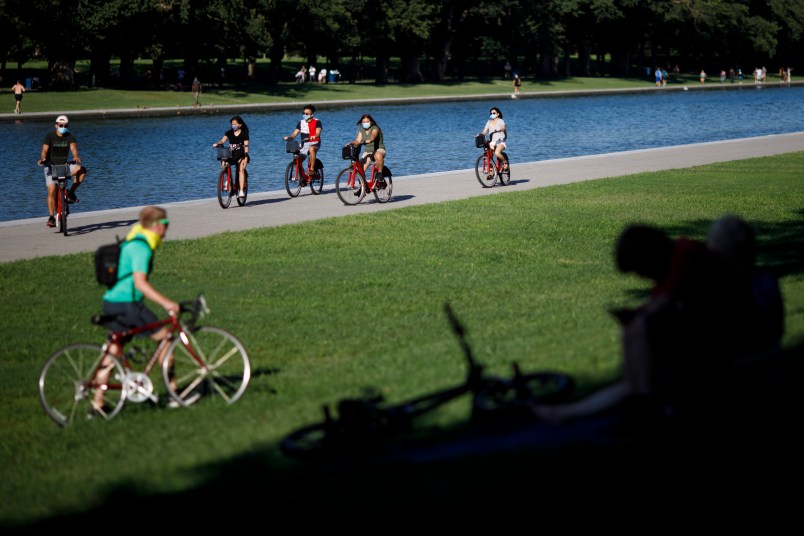With COVID-19 hospitalizations plummeting and vaccinations increasing, some states are beginning to ponder the question: is it time to undo our restrictions?
In many areas, it’s already happening.
Massachusetts Gov. Charlie Baker (R) cited vaccinations as a reason for his reopening plan, which will allow restaurants in the state to operate without capacity restrictions as of March 1.
In New York City, Gov. Andrew Cuomo (D) has allowed movie theaters to open for the first time since the pandemic began. North Carolina Gov. Roy Cooper (D) issued an order allowing bars to reopen and eased indoor gathering limits.
And in Philadelphia, Health Commissioner Dr. Thomas Farley said that the city would roll back capacity restrictions on stadiums, making him “optimistic there would be some fans in the stands on Opening Day for the Phillies.”
“A lot of places are already loosening restrictions,” Dr. Leana Wen, former Baltimore Health Commissioner and a visiting professor at Georgetown University’s School of Public Health, told TPM. “That is happening all around the country.”
The decisions come as case rates fall after a deadly winter surge that brought the country past the gruesome marker of 500,000 COVID-19 deaths since the pandemic began last year.
It also comes as vaccinations have begun to curb the disease’s severity in certain settings. Nursing homes, the source of a huge portion of COVID-19 victims, have seen a 66 percent decline in deaths since vaccinations began in December.
“The single biggest thing that I think is important to remember today when it comes to restaurants and other indoor entertainment venues, and even the outdoor ones, is as COVID cases go down, as vaccines go up, you will find people more comfortable and more willing to go out and play a little bit,” Baker said Thursday.
In North Carolina, Gov. Cooper made a similar appeal, noting in a press release that increased vaccine distribution was allowing the state to take steps towards reopening.
The moves have already received pushback from public heath experts and from those worried about stubbornly high transmission rates of the virus.
Massachusetts State Senator Becca Rausch (D) described the move by Baker as part of “a very long line of irresponsible, dangerous decisions” on Twitter.
“Every expert I know says we must be relentless in COVID precautions,” Rausch wrote.
Let me say this as clearly as possible:
The reopening announcements from @CharlieBakerMA @KarynPolito today are yet more in a very long line of irresponsible, dangerous decisions.
Every expert I know says we must be relentless in #COVID precautions. GOV/LG do the exact opposite. https://t.co/Dlwb0LfqYL— Becca Rausch (@Becca_Rausch) February 25, 2021
The experts themselves cite examples earlier in the pandemic of states reopening too early.
In Rhode Island, then-Gov. Gina Raimondo (D) instituted a “pause” on indoor gatherings and businesses in the state on Nov. 19, faced with skyrocketing case levels.
Case rates began to decrease, and Raimondo lifted the pause on Dec. 20. Then rates went up again.
Vaccinations introduce a new element into the calculus. But Dr. Cindy Prins, an infectious disease epidemiologist at the University of Florida, urged caution, and noted that the vast majority of the public has yet to be vaccinated.
“A lot of people are focusing now on getting the vaccine and going back to normal, but we have to be mindful that we’re going to have a lot of people who can’t be vaccinated, people who are immunocompromised or lower down the priority list,” she said.
The risk of new variants that could spark a fourth wave of the virus remains present, Dr. Eric Topol, a professor of molecular medicine at the Scripps Research Institute, told TPM.
“A lot of this is dependent on containing transmission,” Topol said, adding that the impact of the new variants would likely be clear within a month. “Hopefully there won’t be a surge, but there could be because we’re relaxing things right now instead of tightening.”
Topol went on to say that lower case rates make other tools like contact tracing and intensive testing more practical for managing the pandemic.
“At that low level, you can start to really stop outbreaks,” he said.







This does not seem well considered to me, what with mutated strains developing an ever enlarging footprint.
I will take a pass on going to the theaters and restaurants here in NYC.
Some leaders apparently want to keep learning the lesson of Covid the hard way repeatedly.
That’s fine. Whole thing was a hoax to begin with, cooked up between Hunter Biden and his Chyna business partners to undermine The Greatest President Ever and get Pops elected.
Now we can all stop pretending this was anything other than crisis actors and fake news, and life can go back to normal.
This is the predictable result from the declining numbers and the lack of direction on the matter from the CDC. I have read the CDC is revising it’s guidance. They need to before we have a bounce.
Just get your vaccinations, people. The world is going to go crazy.
@bcgister
Me too.